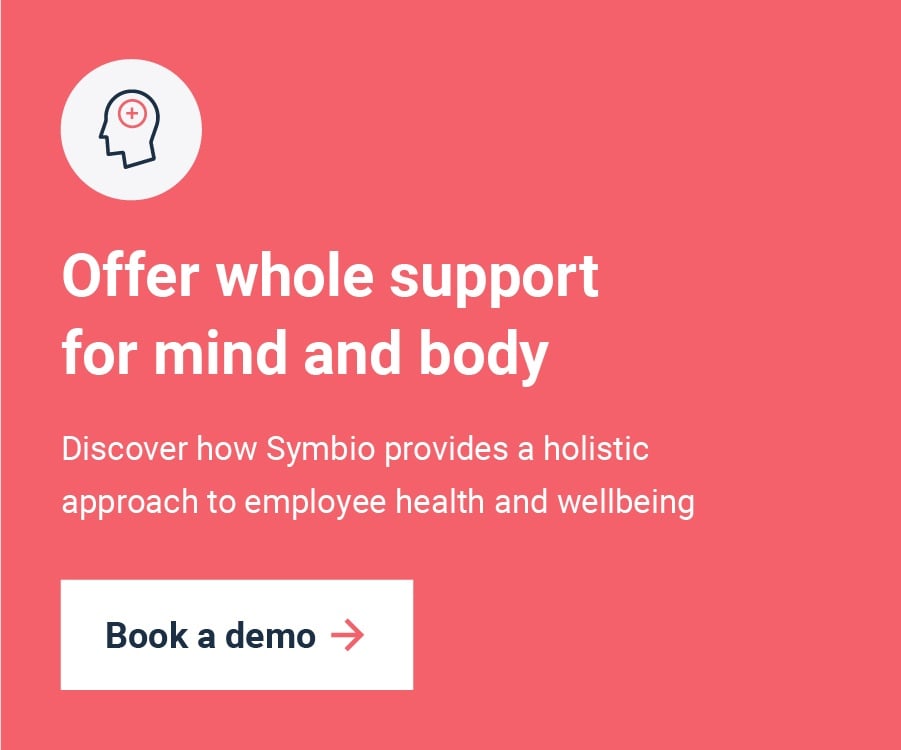Stress, anxiety and depression account for 50 percent of all workplace illnesses in the UK. This is according to a recent UK government report.
Mental health conditions are tough enough to deal with, but it’s worth noting they can also negatively impact physical health. Research shows depression can lead to diabetes, a weakened immune system, and high blood pressure. Despite these consequences, lots of employees still struggle to seek help from their employers
A recent report from PwC shows that embarrassment and lack of confidence can discourage employees from accessing support through their employer.
This emphasises the necessity for providing further employee wellbeing support. However, it can be hard to know exactly how to help.
So, to help you promote mental health awareness in your business, we’ve listed eight activities you could adopt.
1. Open up the conversation
Attitudes towards mental health are changing. But there’s still more ground to cover. Particularly when you consider that 40 percent of men struggle to talk to others about their mental health.
More than this, ‘pleasanteeism’ is on the rise in workplaces. Over 50 percent of workers feel like they have to put on a brave face in front of their colleagues.
To tackle stigmatisation and discomfort, facilitate opportunities for employee-to-employee conversations. This could take the form of daily in-person or virtual chats, or perhaps something more structured. For instance, you might plan a conversation around a timely theme, such as loneliness. Do your employees struggle with loneliness? What measures do they take to combat it?
2. Invest in a workplace speaker
Do you struggle to kickstart these conversations alone? If so, you could source an inspirational speaker elsewhere. Depending on your business size (and budget), this could be a celebrity, mental health advocate or a local mental health expert.
And if looking externally is beyond your budget right now, consider reaching out to the senior leadership team. A champion who is willing to talk openly and push for mental health initiatives sets a powerful example.
Hearing someone else deliver an honest talk on mental health might just help your employees share their own experiences.
3. Challenge your employees
To improve the day-to-day wellbeing of your team members, try setting engaging challenges. You could get your employees to:
- Keep a gratitude journal each day. Practising gratitude can directly increase your happiness levels. A great way to embed gratitude in your workplace is to encourage employees to reflect on their day with a word or emoji at the start of team stand ups or check-ins.
- Take a walk outside during their lunch break. Even a brisk ten-minute walk has a positive effect on your mental health. Whether at the office or distributed, consider ‘walking meetings’ or 1-1s. Also, encourage your team to get outside on their lunch break. You can have fun with this by creating daily challenges using tools like Strava or Fitbit.
- Practice ‘chair yoga’. Yoga is not only brilliant for stress relief and building mental resilience, but it can also improve musculoskeletal fitness. Put time in everyone’s diary or practice as a team. Not only will you feel better, but you’ll bond with your team and share a few laughs along the way.
4. Host a practical workshop
As we’ve already established, half of your employees will suffer from stress, anxiety and depression at some point in their lives.
Investing in mental health workshops, such as stress resilience sessions, can:
- Promote mental health awareness and tackle stigma.
- Facilitate a more open company culture.
- Build effective coping strategies.
On top of this, expert-led workshops can also positively impact your business. Improving the mental resilience of your employees ultimately leads to:
- Fewer sick days and reduced staff turnover.
- Increased employee productivity.
- A happier and more satisfied workforce.
There are plenty of virtual training sessions available, as well as self-run courses. The workshops you adopt will, of course, depend on your size and budget.
That said, ensure any workshop you choose appreciates the importance of mental and physical wellbeing. After all, it’s not just yoga and breathing exercises that can reduce stress, anxiety and depression. A good diet, exercise, and plenty of sleep will go a long way, too.
5. Promote random acts of kindness
Helping others and making human connections isn’t just a nice neighbourly thing to do. It can also benefit your mental health and reduce the negative effects of loneliness.
So, task your employees with the goal of committing one random act of kindness at least once a week. Not only for the wellbeing of others but to help their own mental health, too.
These acts could include:
- Buying a colleague a coffee.
- Offering to take notes in a meeting.
- Carpooling on the way to work.
- Chatting to a colleague over lunch.
- Validating excellent work on a public work platform (or in a meeting).
6. Get active for charity
Go beyond bettering mental health in your own workplace. Bring your team together with a charity activity they can all get behind.
Challenge your employees to complete a walking fundraising event, such as one of Mind’s regular ‘treks’. Or, if you’re not the active sort, host a ‘Tea & Talk’ session. You can donate any money you raise to a cause that supports mental health.
7. Take stock of your employees’ mental health
Are you aware of the current state of mental health in your business? Have you completed a mental health risk assessment to determine what could pose a risk to your employees?
One actionable way to promote mental health awareness and improve wellbeing is to evaluate your own practices:
- Conduct an anonymous mental health survey. Take time to map and understand the mental health of your employees: how many employees have reported a mental health issue or challenge? From there, you can assess what help or support they might need and tailor your healthcare benefits, education, and diversity and inclusion efforts.
- Review your workplace policies. Do you have clear health and safety policies that communicate the importance of mental wellbeing? And is mental health considered throughout other policies? For instance, performance management and redundancy (both of which can negatively impact an employee’s wellbeing).
- Perform a mental health risk assessment. This should identify potential stress factors and their effects on your employees. Once you categorise these risks, you can determine actions, assign responsibilities, and keep track of your ongoing mental health efforts.
8. Invest in accessible mental health support
Did you know that over half of workers cannot access (or don’t know how to access) mental health support at work?
Despite your best intentions and policies, your current healthcare benefits may not be enough for your employees. Particularly if your business works remotely and doesn’t have access to onsite doctors.
This is where a holistic mental health application that blends convenience with human expertise is practical. The right provider will offer a digital experience that helps your employees to actively support their own wellbeing.
Turn awareness into action
‘It’s incumbent on company leaders to drive awareness and action on mental health. By talking about mental health openly and backing up that talk with significant action, leaders can destigmatize mental illness and signal that people can and should access the support the company provides.’ - McKinsey
Promoting mental health awareness is just one way to embrace challenging conversations and support your employees.
But, with workplace pressures contributing to a wider increase in mental health issues, your business must do more. Without effective preventative treatment, your employee’s wellbeing, physical health and work productivity will decrease.
Start small - listen to your employees and their experiences through open conversations and surveys. Then, bring your c-suite onboard to facilitate real, tangible change. This may be through practical workshops that offer mindfulness and nutrition tips. Or you might choose to invest in an expert virtual healthcare service that blends physical health with mental health.
Whatever your next step, keep your employees’ health at the heart of your decision.



%20(1)-1.jpg?width=800&height=450&name=christina-wocintechchat-com-YCrgxs3e9lY-unsplash%20(1)%20(1)-1.jpg)
-1.jpg?width=800&height=450&name=image%20(19)-1.jpg)

